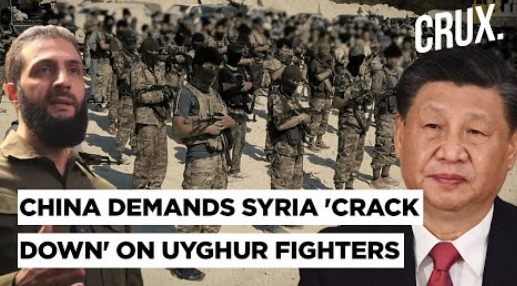Uyghur Militants Rise in Syria
Syllabus
GS 2: India and its neighbourhood
Why in the News?
Recently, the rise of Uyghur militants in Syria’s post-Assad government has alarmed China, as their elevated status threatens Beijing’s internal security and complicates diplomatic influence in West Asia.
China’s Syria Dilemma and Its Implications for India
- The rise of Uyghur militants in Syria’s new power structure has created a new geopolitical fault line for China.
- As Damascus reshapes its politics under President Ahmed al-Sharaa, China finds itself in a bind.
- For India, this changing landscape brings both challenges and opportunities in West Asia and the broader global power game.
China’s Shifting Position in West Asia
Increased Pro-Arab Engagement
- Over the past two years, China has deepened ties with Arab nations by supporting Palestinian causes.
- Hosting Hamas and other Palestinian groups in Beijing enhanced its image across the Arab world, overshadowing the United States in popularity rankings.
China’s Growing Influence
- This shift positioned Beijing as a soft-power alternative to the West in Arab hearts and minds.
- However, geopolitical events in Syria threaten to challenge China’s growing stature, especially with the return of Uyghur militants into power circles in Damascus.
Rise of Uyghur Militants in Syria
Fall of Assad and Rise of Sharaa
- President Ahmed al-Sharaa took control of Syria without major resistance.
- His faction, Hay’at Tahrir al-Sham (HTS), emerged from jihadist movements and quickly established dominance in Damascus.
Uyghur Militants in the Military
- Militants from the East Turkistan Islamic Movement (ETIM), also known as the Turkistan Islamic Party (TIP), have gained significant roles in the new Syrian army.
- Some estimates suggest their number nears 2,000.
- One commander, Abdulaziz Dawood Khodaberdi (aka Zahid), formerly of ETIM, now holds a senior position in the military.
Historical Ties with Jihadist Movements
- From 2011 onward, Uyghur fighters were integrated into global jihadist groups such as IS and al-Qaeda.
- Their propaganda—translated into the Uyghur language—gained traction, including videos threatening China directly.
- A notable example was a 2017 IS video with Uyghur fighters pledging “rivers of blood” against Beijing.
New Power Structure Elevates Former Militants
- Unlike the Taliban in Afghanistan, which distanced itself from Uyghur militants under Chinese pressure, Syria’s new regime has empowered them, giving them legitimacy and influence.
China’s Diplomatic Challenges
Damascus-Beijing Relations Under Strain
- China previously enjoyed friendly ties with Syria under Assad.
- The rise of al-Sharaa and his open embrace of Uyghur militants challenges this balance.
- Beijing now sees a direct threat to its national security from a friendly nation.
U.S. Policy Reversal on ETIM
- The S. had listed ETIM as a terrorist organisation in 2002, aligning with China’s counter-terror goals.
- However, in 2020, Washington removed ETIM from the list, citing lack of credible evidence.
- This undermined China’s narrative and counter-terror strategy globally.
Use of Global Platforms
- China has raised the issue at the United Nations, but with limited support.
- The international community seems more focused on stabilising Syria and preventing refugee crises than aligning with China’s counter-terror agenda.
Western Strategic Interests in Syria
Limiting Influence of China, Russia, and Iran
- Western powers have moved swiftly to engage with Syria’s new leadership.
- Their goals are two-fold:
- establish basic security and prevent migration,
- while keeping adversaries like Russia, Iran, and China at bay.
Transformation of Former Jihadists into Leaders
- Al-Sharaa and his cohorts, once seen as terrorists, are being accepted as state leaders.
- This has complicated China’s diplomacy as even Arab allies of Beijing—like Saudi Arabia and the UAE—are engaging with the new Syrian regime.
Israel’s Role
- Israel remains militarily active in Syria and is aligned with U.S. strategic interests.
- Meanwhile, China’s pro-Palestine stance has created friction with Israel, limiting potential cooperation on Syria.
Implications for India
India’s Interests in West Asia
- India has growing energy and trade interests in West Asia.
- Over 8 million Indian expatriates live in the region, especially in Gulf countries.
- A stable Syria is important to regional peace, affecting India’s economic corridors and trade routes.
India-Syria Relations
- Historically, India has maintained cordial relations with Syria, providing humanitarian aid during the civil war.
- India’s approach is based on non-interference and support for sovereignty.
- With the new regime in Syria gaining legitimacy, India will have to re-evaluate how to maintain its presence and principles.
Concerns Over Uyghur Militancy
- Though India is not directly affected by ETIM, its growing influence in Syria has broader regional consequences.
- Radicalisation networks could impact South Asia in the long term.
- India, like China, opposes terrorism in all forms, but does not publicly align with Beijing’s internal policies on Uyghurs.
India’s Strategic Calculations
Balancing Ties with China and the U.S.
- India must balance its growing closeness with the U.S. and its cautious engagement with China in the region.
- It cannot openly support Beijing’s position on ETIM, but must remain vigilant about cross-border terrorism.
Counter-Terrorism Cooperation
- India should enhance intelligence cooperation with countries in West Asia and work with the global community to track the movement and influence of transnational militant groups like ETIM.
Expanding Diplomatic Engagement in Syria
- India could use Track-II diplomacy or regional forums to engage with the new Syrian leadership without formal recognition, safeguarding its strategic interests.
Energy and Infrastructure Partnerships
- As Syria rebuilds, India could position itself as a partner in reconstruction through energy, healthcare, education, and infrastructure support—without aligning with any specific faction.
Opportunities for India
- Projecting Soft Power: India can leverage its non-aligned, neutral foreign policy tradition to build trust in Damascus.
- Strategic Depth: Strengthening ties with Syria could provide India with a foothold in the eastern Mediterranean.
- Regional Multilateralism: India can play a balancing role through platforms like the West Asia Quad (India, Israel, UAE, USA).
Conclusion
The rise of Uyghur militants in Syria challenges China but opens new geopolitical opportunities for India. With careful diplomacy and strategic foresight, India can navigate these developments to protect and advance its regional interests.
Source
The Hindu
Mains Practice Question
Discuss how Syria’s evolving political-military structure could impact India’s strategic and diplomatic ambitions in West Asia.






